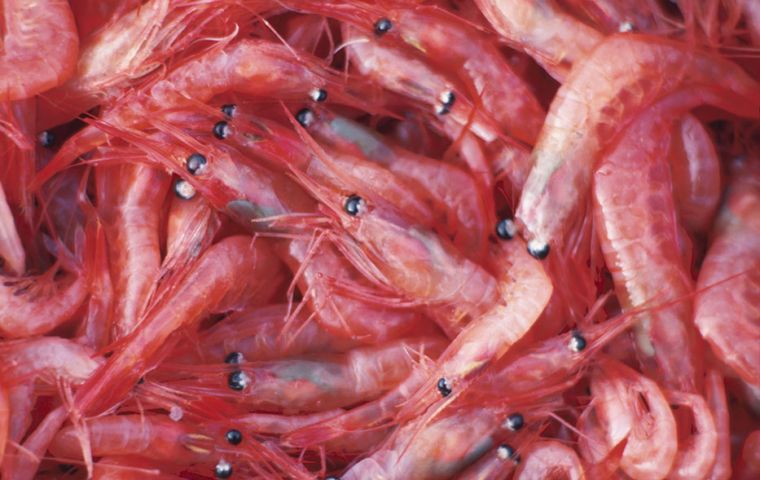MercoPress. South Atlantic News Agency
Beware: China announces plan to seven-fold increase Antarctic krill catches
 “We will increase our investment in the Antarctic area in terms of krill fishing,” said Liu Shenli, from China National Agricultural Development Group
“We will increase our investment in the Antarctic area in terms of krill fishing,” said Liu Shenli, from China National Agricultural Development Group Conservation groups and scientists worry that China’s push to boost its harvest of krill -- a shrimp-like creature used for aquaculture feed and human supplements -- may leave Antarctica’s whales, seals and penguins struggling to survive. China’s leaders say they want a seven-fold increase in krill production, according to a recent report in the state-owned China Daily newspaper.
China is one of several nations, including Norway, Korea and Chile, harvesting krill with massive factory ships dragging miles-long trawl nets through the productive cold waters of the Southern Ocean. The krill is quickly frozen and into processed into pellets for aquaculture and livestock operations, fish bait, and high-value “nutraceuticals” such as omega-3 dietary supplements.
That sharing may be tough for the animals that rely on krill as their main source of food. When penguins and other animals breed, they can only travel so far while raising their young. That’s especially true around the Antarctic Peninsula, which happens to be a hotspot for both krill and the larger creatures that eat it.
“We will increase our investment in the Antarctic area in terms of krill fishing,“ said Liu Shenli, chairman of the China National Agricultural Development Group and a member of the National Committee of the Chinese People's Political Consultative Conference. ”Krill provides very good quality protein that can be processed into food and medicine. The Antarctic is a treasure house for all human beings, and China should go there and share.”
“The issue isn’t so much the size of the entire (krill) population, but where they are taking it,” said Claire Christian, a spokeswoman for the Antarctic and Southern Ocean Coalition, a Washington-based advocacy group. “Some of these larger ships could deplete all the krill in a local area. That would create problems.”
Fishing around Antarctica is governed by the Conservation of Antarctic Marine Living Resources, (CCAMLR), a Hobart-Australia-based treaty organization. China is a signatory to the treaty.
While the current 4.2 million metric ton catch limit for Antarctic krill is much higher than the amount currently harvested, the problem is that the science behind the krill population estimates may be outdated.
George Watters, a fisheries scientist at the National Oceanic and Atmospheric Administration’s Southwest Marine Fisheries Center in La Jolla, Calif., says the surveys that resulted in the limit were conducted more than 15 years ago. Watters says that new studies are needed to get a better picture of how abundant krill is today, especially around the Antarctica Peninsula.
The water and air temperature around the peninsula has warmed faster than any other place on Earth, leading to concerns about populations of several penguin species, whales and other marine mammals. Krill forms the base of the food chain, and may be at risk as well, explained Watters.
“Climate change is a major force in that region, and is creating big changes in the (Antarctic Peninsula) ecosystem,” Watters said. “A legitimate concern is to how productive will the krill stock be in the future. There are papers to suggest it will be less productive. That’s a reason why there is an effort to change the catch limit for krill so it is updated more regularly.”
Since the ocean around Antarctica is considered international waters, enforcement of fisheries rules relies on self-reporting by countries that sign the CCAMLR treaty. That could make China’s new effort harder to monitor at sea, especially since it has eight 5,000 to 7,000 metric ton factory krill trawling ships, more than any other nation. (FIS)




Top Comments
Disclaimer & comment rules-

-

-

Read all commentsNo doubt CFK will send her navy to stop the Chinese, and write letters to the UN,
Apr 30th, 2015 - 12:06 pm 0lolol
This is likely just a precursor to the Chin taking more and more of the food of the world and stuff the environment and wildlife.
Apr 30th, 2015 - 12:54 pm 0Wars have been fought over less.
Another good reason why the Falklands need to remain British . Otherwise the Chinese would “ lease ” them from Argentina for 50 years and turn them into a deep sea fishing hub from where they would hoover up every living creature out of the S Atlantic .
Apr 30th, 2015 - 02:25 pm 0Commenting for this story is now closed.
If you have a Facebook account, become a fan and comment on our Facebook Page!